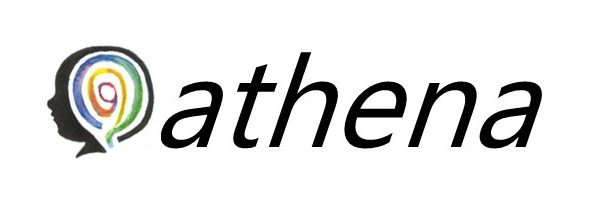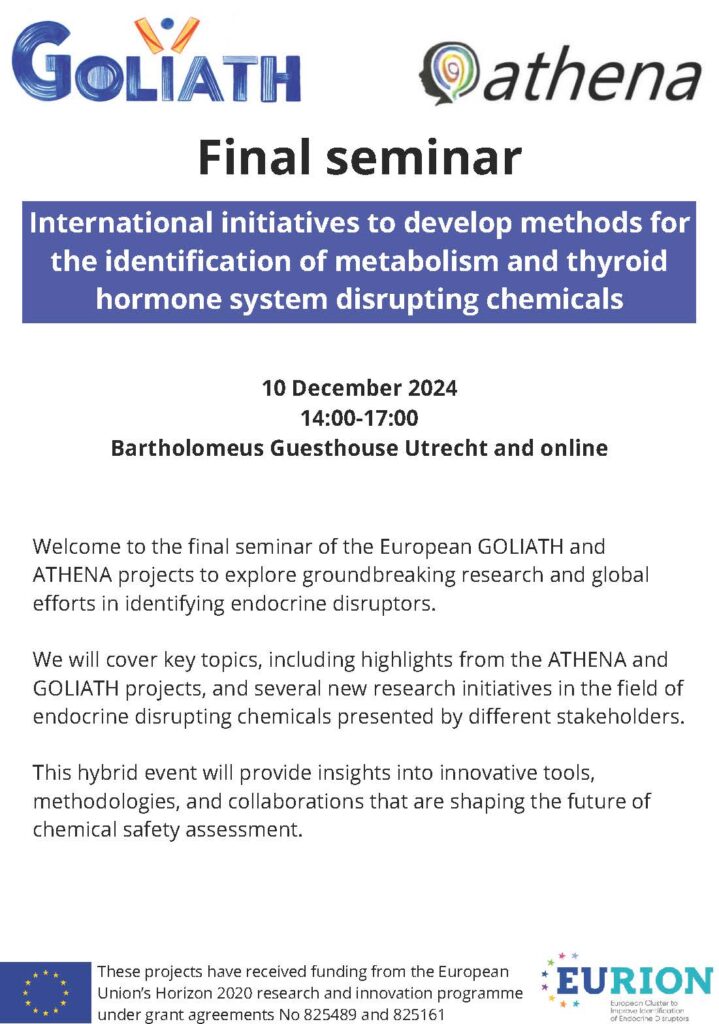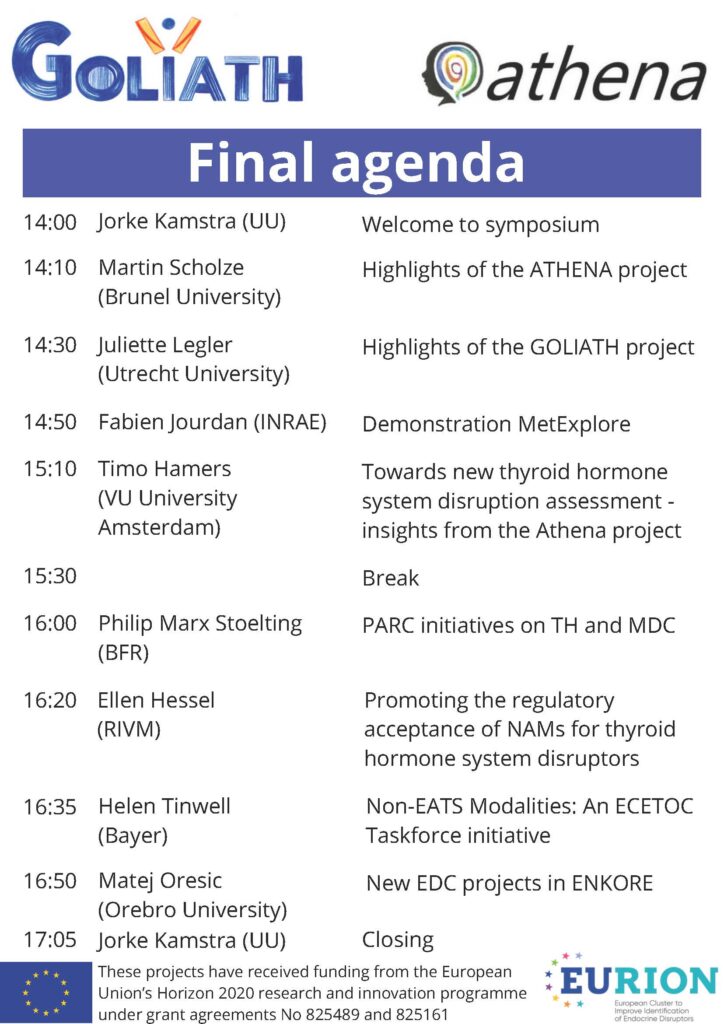ATHENA
Assays for the identification of Thyroid Hormone axis - disrupting chemicals: Elaborating Novel Assessment strategies
News
The ATHENA project’s final meeting was held in London on 25th and 26th November. Attended by members of the consortium.
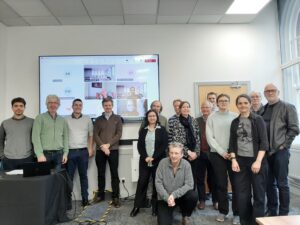
A new policy brief has been prepared by the EURION Cluster, the eight research projects funded by the Horizon 2020 Research and Innovation Programme, focused on developing methods and testing strategies for under-studied dysfunctions caused by EDs, including metabolic, brain, thyroid and reproductive disorders. Launched in 2019, the cluster was the largest of its kind, with over €50 million of funding and brought together more than 70 groups to synergise their research. After 5.5 productive years, the projects are coming to a close at the end of June 2024.
The policy brief explains how EDs have been linked to public health issues including obesity, diabetes, neurodevelopmental delay and fertility disorders and how each of the EURION research projects have contributed research to support the development of internationally harmonised strategies and guidelines for testing EDs and assessing these associated health risks.
To read: https://eurion-cluster.eu/wp-content/uploads/2024/06/EURION-policy-brief_June2024.pdf
The EURION Cluster Final Conference was held over 2-days in Brussels and online on 13-14 June 2024 ATHENA took part in the conference as one of the 8 research projects of the EURION Cluster funded by the EU under the same call for 5 years until 2024. The aim of EURION (European Cluster to Improve Identification of Endocrine Disruptors) was to develop new testing and screening methods to identify endocrine disruptors (EDs).
Day1 consisted of presentations by all projects outlining their methods and achievements, followed by a panel discussion with EURION project coordinators.
Day 2 was the EURION Stakeholder Conference and the ENKORE Cluster (newly EU-funded projects formed in January 2024) kick-off meeting.

Professor Josef Köhrle (Charité) presented at a symposium which was part of the programme of the International Society of Endocrinology meeting (ICE 2024), held in Dubai from 1-3 March 2024. The symposium called ‘The impact of endocrine disrupting compounds on human health and the role of the endocrinologist – in policy and education’ highlights the increasing importance of the EDC topic at international level.
The ATHENA project meeting was held over 2 days at partner institute DTU, Lyngby in Copenhagen.

The European Society of Endocrinology organised an event held at the European Parliament on 7th June 2023 titled ‘Shaping an ambitious legislative framework for endocrine disruptors: A high-level panel discussion on the gaps between science and legislation’
ATHENA partner Professor Robin Peeters from ERASMUS MC, spoke about some of the work carried out in the ATHENA project.
The 4th ATHENA project meeting was held at partner institute, VU Amsterdam.

This online meeting was held on 1-2 February 2023 to discuss developments in the assessment of thyroid disrupting effects of chemicals.
Professor Andreas Kortenkamp gave an update on development of new approaches and test methods in the ATHENA project and an overview of the EURION Cluster
The 4th Annual Forum on Endocrine Disruptors, organised by the EU DG Environment in collaboration with ANSES was held on 21-22 September 2022.
Professor Andreas Kortenkamp presented the session on the thyroid system and its vulnerability to EDCs. His presentation included an overview of the work carried out within ATHENA and the EURION Cluster.
A joint workshop was held between three EURION projects: ERGO, ENDPoiNTs and ATHENA at Universidad Complutense de Madrid.
The aim of the workshop was to increase the synergies between the projects and consolidate common interests.
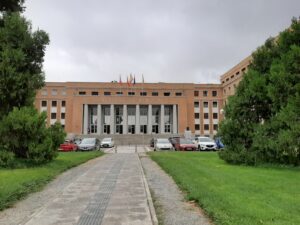
The 3rd ATHENA annual project meeting was held in Windsor, UK.
The Berlin Research Prize 2021 for the promotion of ‘Alternatives to Animal Testing’ has been awarded to Caroline Frädrich and Prof. Dr. Josef Köhrle (CHARITE) and Dr. Kostja Renko (BfR) for the establishment of a versatile high-throughput screening platform for identifying endocrine disruptors based on the Sandell-Kolthoff reaction.
This prize is awarded every two years in collaboration with the Association of Research-Based Pharmaceutical Companies (vfa) and the Senate Department for Justice, Anti-Discrimination and Consumer Protection and has been initiated and coordinated by the State Office for Health and Social Affairs (LAGeSo) since 2011. Check out this short film about the award-winning research work : https://www.youtube.com/watch?app=desktop&v=jbYLt6Nhv3o
The second ATHENA annual general meeting was held online on Teams
Interview with Professor Andreas Kortenkamp in Chemical Watch in which he discusses the urgency for test validation for endocrine disruptors.
Read the full interview here:
https://chemical-watch.s3.eu-west-1.amazonaws.com/downloads/Andreas-Kortenkamp-EDs.pdf
Demeneix B, Vandenberg LN, Ivell R, Zoeller RT. Thresholds and endocrine disruptors: An Endocrine Society Policy Perspective. https://doi.org/10.1210/jendso/bvaa085
Gilbert M, O’Shaughnessy K, Axelstad M. Regulation of Thyroid Disrupting Chemicals to Protect the Developing Brain. Endocrinology https://doi.org/10.1210/endocr/bqaa106
An overview of the ATHENA project now published in International Journal of Molecular Sciences
Our CNRS /MNHN partners have recently published a review on non-mammalian in-vivo models for thyroid hormone disruptors
DTU have recently published a paper on QSAR models for CAR agonism and antagonism (see also Results tab). https://doi.org/10.1016/j.comtox.2020.100121
The first ATHENA annual general meeting for the project was held in Paris at the Museum National d’Histoire Naturelle. This was followed by the EURION cluster meeting and validation workshop on 4-5th February.
Letter by Professor Barbara Demeneix on chemical pollution (EDCs) and brain development published in the Financial Times. Chemical pollution is another ‘asteroid threat’ Financial Times (11.01.2020)
Accordion Content
